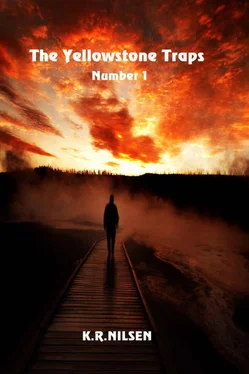The crew huddled about the little boiler for warmth as the ship plied the icy surface of the waters. Far to the south down Big Stone Lake, smoke from the grain fires, ever smoldering inside the concrete grain silos, still trailed eastward on the incessant wind, sometimes dodging to earth to obliterate the farming town, sometimes running ruler straight hundreds of feet over the black waters. Abel kept an eye on the smoke and pondered the fate of Harland Sven. Was the farmer still alive to see the white ribbons of vaporized grain? He hadn’t seen the man for two weeks, hadn’t seen anyone in Sweetly, for that matter. But fresh food that had been delivered repeatedly to the brewery as promised, and some fraction of it had disappeared. At least a few South Dakotans were taking advantage of the victuals, behaving as nocturnal mammals would, perhaps, coming in the night unseen to forage under cover of darkness and to hole up by day out of the light.
Two hours running behind it, Max’s watercraft closed within a quarter mile of Sweetly. Winnie, intent on the landing, observed something moving in the clouds of white grain smoke drifting over the townscape and hugging the ground. A stick figure emerged from the particle haze standing at the shoreline.
“Abel, someone’s there.” Winnie raised an arm and waved toward the south. “Do you see it?”
Abel surveyed the water’s edge and picked out a slender vertical line, black against the white grain smoke.
“Our man is still with us, I think.”
“Harland?”
“Yes, the farmer.”
As the steamer made landfall, Abel leapt from the craft, splashed down in the frigid lake water, kicked plates of ice aside and jogged before the scarecrow at lakeside.
“Harland,” uttered the crewman as he came forward out of the lake, “We thought something happened to you.”
“Never mind me,” the farmer rumbled. “There are still a few people here. They’ve got to be taken out.”
“All right, we can do that.”
“Sweetly is no place for them anymore.”
“How many, Harland?”
“Just six, no more.”
“That’s it? Where are the rest of your townsfolk?”
“Evacuated, gone to Sioux Falls, they tell me, then all the way out to Minneapolis.
“How?”
“The Guard took them out by train just a day or two after the silos went up.”
“Where are those you managed to locate?”
“In the coop office. They had to get out of the school. No one can live in there anymore.”
“Are they in any condition to make the trip across the lake?”
“I’m not sure. I think maybe.”
“Okay, bring them down in two, three hours. We’ll be loaded then. They can sit on the raft. We’ll wrap them up in something to keep them warm. It will be a slow, cold ride back to the bluffs.”
As instructed, Harland led a meager band to the lakeshore, a few women, one man and several teens reduced to flesh-clothed skeletons, faces rigid with fright and simmering with rash. Harland assisted each in boarding the barge, now heavy with a conical pile of corn covered with tarpaulin. Once all were settled and protected from the wind swirling over the waters, Harland left the raft, gained the shore and swiveled to watch the crew of Max’s steam creation shove off.
Winnie hailed Abel and pointed out the farmer, feet planted in ash ashore, the grain silos belching smoke at his back.
“Harland, for goodness sake, man, come on board,” howled Abel as he vaulted from the deck and raced to confront the farmer.
“Take care of those people, mister.”
Nose in Harland’s face, Abel searched the farmer’s fixed hazel eyes. “You’re not going to tell me you won’t make the trip north with us.”
“I’ve got things to tend to here.”
Abel backed away a step, turned aside, and cast his eyes to the dull heavens. “There can’t be anything to tend to in this town any longer, farmer.”
“Why, of all people, would you give a damn about it, or about me, for that matter?”
Abel rolled his lower lip out and back. “Too much death, Harland. Too much! We need to get on with the business of living, every one of us. If you don’t get on that boat, we won’t be back until the ice goes out next spring. You won’t survive here alone.”
“I can fend for myself.”
Abel shifted on his boot heels, back and forth. “Look, Harland, you’re a man of the earth. You’re about growing things, about raising living things up from nothing, not withering in the face of hardship. You told me your father sat you on his lap on his John Deere when you were barely old enough to walk. He taught you what it took to wrest food from the land, from the elements. I don’t imagine he taught you how to give up.”
Harland narrowed his gaze to pinholes, his lips pursed.
“Make the journey with us, farmer. You can go to work with us first thing tomorrow morning. You can get your hands dirty in the good earth once again. That’s what you do. That’s what you have always done. There is no way you are going to give that up.”
The bony figure shrugged his shoulders but committed to not a thing.
Abel blew out a cyclone of frustration, rotated 180 degrees on his heels, and paced to the shoreline, leaving Harland locked down in his boot prints. Max helped the town founder aboard the lake steamer.
“Will you come aboard, Harland?” offered Abel aloud.
Harland tilted his head back to better view the fat smoke plumes trailing from the grain silos, the white acrid clouds as thick as the night the towers erupted in flames.
Max tugged on the whistle cord to let out a banshee wail of live steam. The powered scream rolled away mile after mile down the thirty miles of open lake water.
The farmer cast a look over his right shoulder at the little vessel and the human cargo aboard, a dozen pairs of eyes burrowing into his hide. A hand went up to scratch the white bristle on his topknot.
“Abel?” Harland croaked.
“Talk to me, farmer.”
Harland brought his hand down from his scalp and rubbed his fingers across his heart. He did not make eye contact with Abel for twenty long seconds.
“I’ll be along.”
At first light on the morning of the vernal equinox, human figures streamed from Independency village’s many modest homes through white hard March cold. Each shuffled briskly along shoveled paths up the hill to the greenhouse complex, its powerplant stack trailing a thin streamer of condensation and sawdust smoke.
Throughout the entire month a seamless quilt of moisture-poor snow clouds lay draped over the bluffs. Water vapor was locked away in floating needle crystals, drifting aimlessly. Dry snows atop the frozen earth served as an effective foil to incessant clouds of fine volcanic dust that, until freeze up, wafted across the mid-continent on the ever-present winds off the western prairie.
The sun was but a memory. The frigid monotony of the weather strangled the spirit of colonists and retarded the growth of the greenhouse plants in the unheated high tunnels. The heated greenhouses, though, their banks of lighting glowing day and much of the night, were a riot of foliage and a temperate oasis for the winter weary.
Citizens climbed the elevation, making for one of the heated structures, Strawberry Cathedral. A group of four carried a flat object the size of a small table, to be wrestled through the small east door of the hothouse. Down the four interior steps they shuttled, descending below grade level, and there they clustered in the narrow workspace at the east end of the building or fanned out among the many hundreds of strawberry towers sprouting from the floor.
Most coming along in the dusky dawn observed that the sky seemed open and bright. The persistent cloud blanket had thinned out during the night. The dawn seemed promising, as did the annual equinox service.
Читать дальше










